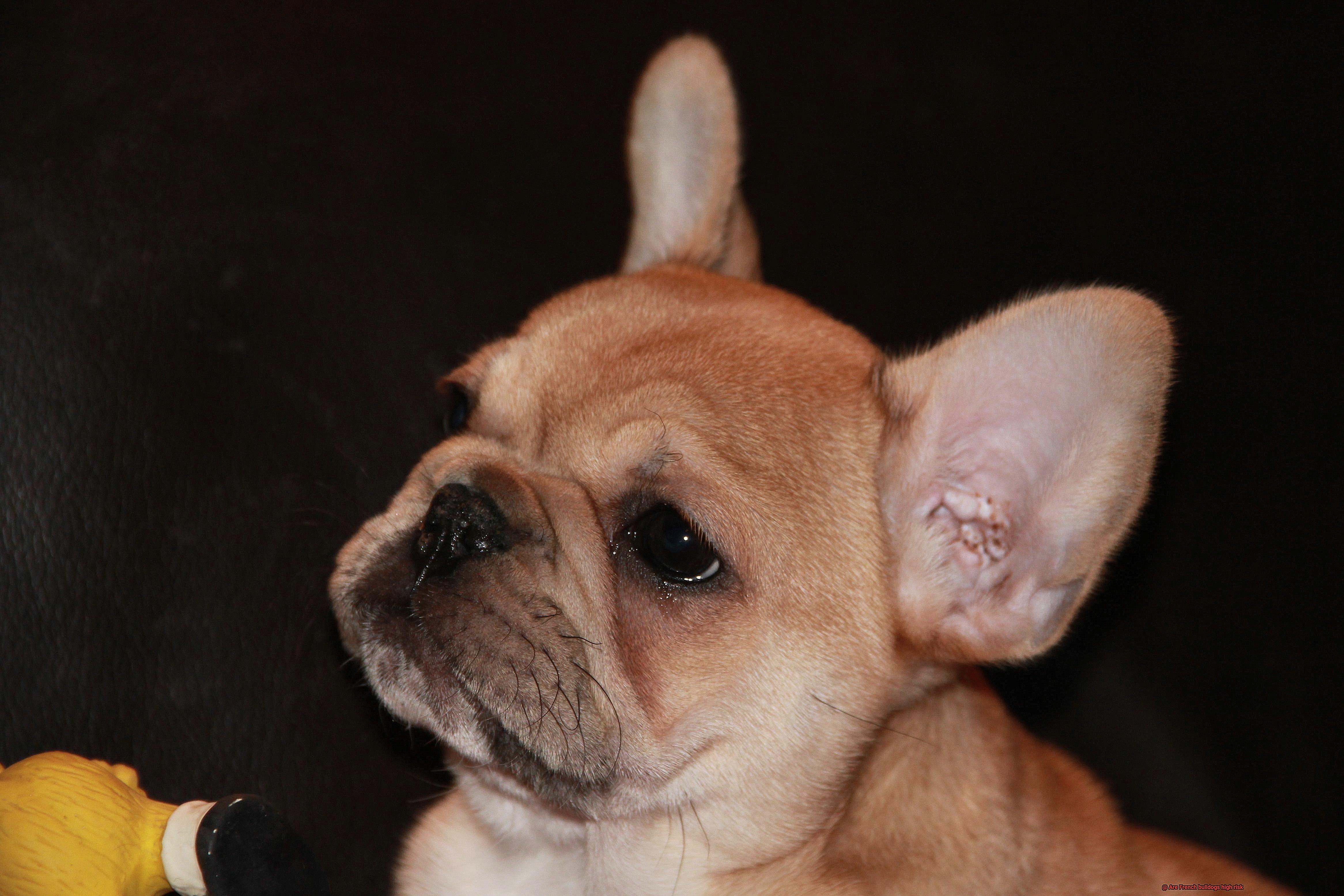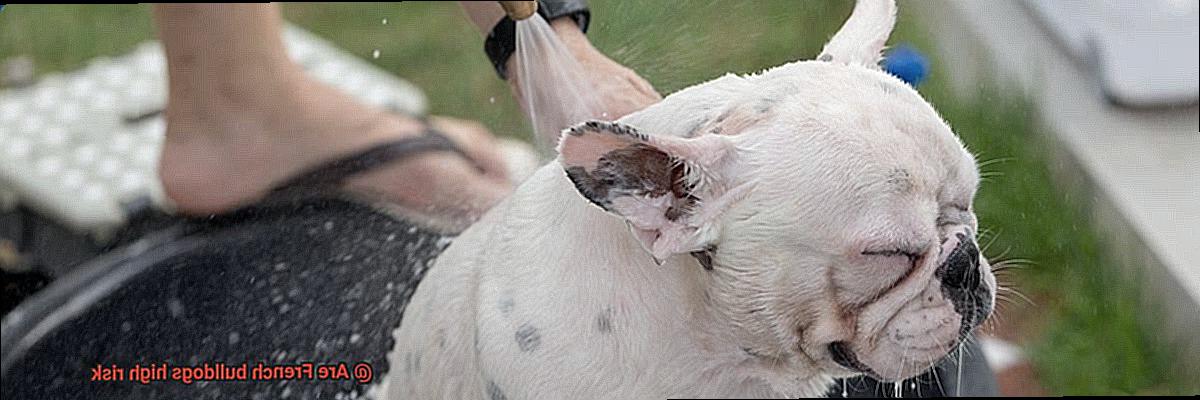Are French bulldogs high risk?
Picture a furry friend overflowing with charm, rocking a sturdy frame, adorable bat ears, and a personality that can melt even the toughest skeptics’ hearts. Enter the captivating French Bulldog – a breed that has skyrocketed in popularity lately. These little darlings have found their way into countless homes, but it’s time to dig deeper and uncover the potential risks that come with owning one.
In this gripping blog post, we embark on an eye-opening journey to unveil the truth about whether French Bulldogs are high risk. Armed with expert insights and unbiased information, we’ll explore health concerns, genetic predispositions, and specific care requirements every potential owner should know before welcoming these lovable canines into their lives.
Despite their charming looks, French Bulldogs might be hiding a darker side you’ve never heard of. As we peel back the layers of their enchanting allure, get ready to be amazed, concerned, and ultimately enlightened about the unique challenges and risks associated with these delightful companions. So buckle up and dive into the intriguing world of French Bulldogs – let’s find out if they’re truly high risk or just misunderstood.
Brachycephalic Airway Syndrome in French Bulldogs
Contents
- 1 Brachycephalic Airway Syndrome in French Bulldogs
- 2 Heatstroke Risk in French Bulldogs
- 3 Genetic Disorders Common to French Bulldogs
- 4 Skin Allergies and Ear Infections in French Bulldogs
- 5 Obesity Risk for French Bulldogs
- 6 Preventative Care for French Bulldog Health Issues
- 7 Veterinary Check-Ups for French Bulldog Owners
- 8 The Benefits of Owning a French Bulldog Despite the Risks
- 9 Conclusion
Their adorable flat faces and charming snorts and snores are part of what makes them so lovable. However, these endearing features can also put them at risk for a health condition called Brachycephalic Airway Syndrome (BAS). In this blog post, we’ll explore the causes and risk factors of BAS in French Bulldogs and provide tips to keep your furry friend healthy and happy.
Causes of Brachycephalic Airway Syndrome:
Anatomical Factors:
French Bulldogs have shortened and narrowed airways due to their brachycephalic skull structure. This can lead to breathing difficulties, including snorting, snoring, wheezing, and even choking. The shape of their face restricts the flow of air, making it harder for them to breathe properly.
Obesity:
Excess weight can exacerbate the symptoms of BAS in French Bulldogs. It puts additional strain on their already compromised airways, making it even more challenging for them to breathe comfortably. Maintaining a healthy weight through a balanced diet and regular exercise is crucial to reducing the risk and severity of BAS.
Allergies and Infections:
French Bulldogs with BAS are more prone to allergies and infections that can further worsen their respiratory symptoms. Keeping their environment clean, avoiding exposure to potential allergens, and regular veterinary check-ups can help manage these risk factors.
Risk Factors for Brachycephalic Airway Syndrome:
Genetics:
The unique anatomy of French Bulldogs makes them predisposed to developing BAS. When choosing a breeder, it’s important to select one who prioritizes the health and well-being of their dogs. Responsible breeders perform health screenings on their breeding stock to minimize the risk of passing on genetic predispositions to BAS.
Environmental Factors:
Extreme weather conditions, particularly heat and humidity, can exacerbate the breathing difficulties of French Bulldogs with BAS. Avoiding strenuous exercise during these conditions and providing a cool and well-ventilated environment can help mitigate the risks.
Heatstroke Risk in French Bulldogs
As a proud owner of a French Bulldog, it’s important to be aware of the unique heatstroke risk that these adorable pups face. With their short snouts and narrow nostrils, French Bulldogs have difficulty regulating their body temperature effectively, making them more susceptible to overheating in hot weather
Combine this with their thick coat and brachycephalic (flat-faced) structure, and you have a recipe for heatstroke if precautions aren’t taken.
Heatstroke occurs when a dog’s body temperature rises above normal levels, typically around 101 to 102.5 degrees Fahrenheit. It’s a serious condition that can lead to organ damage or failure if not treated promptly. So, how can you prevent heatstroke in your French Bulldog and keep them cool and safe? Let’s dive in.
Limit Exercise in Hot Weather
French Bulldogs are known for their energy and enthusiasm, but it’s important to avoid excessive exercise during hot weather. Stick to shorter walks and engage in playtime indoors where it’s cooler. Save those longer adventures for the cooler parts of the day, such as early mornings or late evenings.
Provide Shade and Fresh Water
Make sure your French Bulldog has access to shade at all times, especially during the hottest hours of the day. Set up a shaded area in your yard or invest in a canopy or umbrella for outdoor activities. Additionally, always ensure that fresh water is readily available for your furry friend to stay hydrated.
Never Leave Them Unattended in a Car
You’ve probably heard this countless times, but it bears repeating: never leave your French Bulldog unattended in a car, even for a few minutes. The temperature inside a car can rise to dangerous levels within minutes, putting your pup at risk of heatstroke and even death.
Consider Cooling Products
To help your French Bulldog stay comfortable in hot weather, consider using cooling products such as cooling mats or vests. These specially designed products provide a cool surface for your pup to lie on or wear, helping to lower their body temperature.
Recognize the Signs of Heatstroke
It’s crucial for French Bulldog owners to be aware of the signs of heatstroke. Look out for excessive panting, drooling, rapid breathing, weakness, collapse, and even seizures. If you suspect your furry friend is suffering from heatstroke, take immediate action.
Take Immediate Action if Heatstroke is Suspected
If you notice any signs of heatstroke in your French Bulldog, it’s important to move them to a cool area immediately. Offer them water to drink, but do not force it. Wet their paws with cool water and contact a veterinarian as soon as possible for further guidance and treatment.
Genetic Disorders Common to French Bulldogs
French Bulldogs are adorable and lovable pets, but they are also prone to certain genetic disorders. As a responsible owner, it is important to be aware of these conditions and take steps to manage them. In this article, we will discuss the common genetic disorders seen in French Bulldogs and provide helpful tips on how to care for your furry friend.
Brachycephalic Airway Syndrome (BAS)
Due to their flat faces and shortened airways, French Bulldogs are more susceptible to breathing difficulties. Signs of BAS include snoring, wheezing, and labored breathing. In severe cases, surgical intervention may be required to alleviate the obstruction. To manage BAS, avoid strenuous exercise in hot weather, provide plenty of fresh water, and monitor your Frenchie closely for any signs of respiratory distress.
Intervertebral Disc Disease (IVDD)
French Bulldogs have a compact build that puts extra strain on their spine, making them more prone to IVDD. This condition can cause pain, mobility issues, and even paralysis. To prevent IVDD, avoid activities that put excessive strain on your dog’s back, such as jumping from high surfaces. Regular exercise and maintaining a healthy weight can also help reduce the risk.
Patellar Luxation
Patellar luxation refers to the dislocation of the kneecap, which can cause lameness and discomfort. While some cases may require surgery, mild patellar luxation can often be managed with conservative treatment. Regular exercise and maintaining a healthy weight are key in preventing this condition.
Hip Dysplasia
Hip dysplasia is a common genetic disorder that affects the hip joints, causing pain and reduced mobility. While it is more commonly seen in larger breeds, French Bulldogs are also prone to this condition. Regular veterinary check-ups and proper nutrition can help manage hip dysplasia. Additionally, avoiding activities that put excessive strain on the hips, such as jumping or climbing stairs, can help reduce the risk.
Allergies

French Bulldogs are known to have sensitive skin and are prone to allergies. Common allergens include certain foods, environmental factors, and contact with specific materials. To manage allergies, identify and avoid triggers, such as certain ingredients in their diet or environmental irritants. Regular grooming and keeping your Frenchie’s living environment clean can also help minimize allergic reactions.
Eye Disorders
French Bulldogs are susceptible to various eye disorders, including cherry eye, cataracts, and progressive retinal atrophy (PRA). Regular eye examinations by a veterinarian are crucial in detecting these conditions early on. If any abnormalities are noticed, prompt treatment is necessary to prevent further complications.
Skin Allergies and Ear Infections in French Bulldogs
French Bulldogs are known for their charming personalities and irresistible looks. However, they are also prone to certain health issues, including skin allergies and ear infections. As a French Bulldog owner, it’s crucial to understand the causes, symptoms, and treatments for these common problems. In this article, we’ll delve into the world of skin allergies and ear infections in French Bulldogs, providing you with expert advice on how to keep your furry friend comfortable and healthy.
Skin Allergies in French Bulldogs:
Skin allergies in French Bulldogs can be triggered by various factors such as environmental allergens, food allergies, or contact allergies. Common symptoms include itching, redness, hair loss, and the development of sores or hot spots on the skin. To manage skin allergies in your French Bulldog:
- Consult with a veterinarian to identify the allergen(s) causing the reaction.
- Remove or minimize exposure to the allergen(s) in your dog’s environment.
- Consider dietary changes tailored to your dog’s specific needs.
- Regularly bathe your French Bulldog using a medicated shampoo recommended by your vet.
- Use soothing creams or ointments to alleviate itching and promote healing.
Ear Infections in French Bulldogs:
French Bulldogs have unique ear structures that make them more susceptible to ear infections. Moisture buildup and poor ventilation can create an ideal breeding ground for bacteria and yeast. Look out for symptoms such as scratching or rubbing at the ears, foul odor, discharge from the ears, and redness or swelling of the ear canal. Here’s how you can prevent and treat ear infections:
- Regularly clean your French Bulldog’s ears using a veterinarian-approved cleaning solution.
- Gently dry the ears after bathing or swimming to prevent moisture accumulation.
- Avoid excessive use of cotton swabs, as they can push debris further into the ear canal.
- Use veterinarian-recommended ear drops to treat and prevent infections.
- Seek professional help if your dog’s ear infection persists or worsens.
Obesity Risk for French Bulldogs
Today, we’re going to tackle a topic that’s as important as croissants are to breakfast – obesity risk for our beloved furry friends. As cute as those chunky rolls may seem, extra weight can lead to serious health problems for French Bulldogs. So, let’s dive in and explore the risks of obesity and the paw-some steps we can take to prevent it.
Genetic Predisposition and Physical Characteristics:
Did you know that French Bulldogs have a higher risk of obesity compared to other dog breeds? Blame it on their adorable brachycephalic (short-nosed) structure. This can make breathing and exercising more challenging, putting them at a greater risk of weight gain.
Slow Metabolism and Voracious Appetite:
Another reason these little charmers are prone to packing on the pounds is their slower metabolism. They require fewer calories than other breeds, but their love for food knows no bounds. So, be vigilant and avoid overfeeding your Frenchie. It’s like saying “non” to that extra pain au chocolat.
Health Consequences of Obesity:
Obesity can unleash a whirlwind of health problems for our Frenchies. From joint issues to heart disease, diabetes, and respiratory difficulties, the risks are no joke. Existing conditions like hip dysplasia and arthritis can also worsen with extra weight. Let’s keep our furry pals light on their paws.
Prevention is Paw-sible:
How can we keep our French Bulldogs fit and fabulous? It’s all about finding the right balance between diet and exercise.
- Portion Control: Serve a balanced diet with appropriate portion sizes that meets their nutritional needs without going overboard on calories.
- Regular Exercise: French Bulldogs may not be marathon runners, but they still need regular exercise. Short, frequent walks or play sessions are the way to go. Avoid extreme temperatures and keep an eye on their breathing – remember, they’re not Olympic athletes.

Monitoring and Professional Help:
To prevent obesity, regularly monitor your Frenchie’s body condition score. Feel for fat deposits around the ribs and spine. Adjust their diet and exercise accordingly if needed. And hey, don’t hesitate to consult a veterinarian or a professional dog nutritionist for tailored advice. They’ll be your weight management allies.
Preventative Care for French Bulldog Health Issues
French Bulldogs are undeniably adorable, with their squishy faces and playful personalities. However, like any breed, they can be prone to certain health issues. The good news is that by incorporating preventative care strategies into their routine, we can help our French Bulldogs live long, healthy, and happy lives. In this blog post, we’ll explore some practical tips to keep your furry friend in top shape.
Feed the Right Fuel:
A balanced diet is the foundation of good health. Choose a high-quality dog food specifically formulated for French Bulldogs’ unique nutritional needs. Be mindful of portion sizes to prevent weight gain and its associated health problems. Remember, treats are okay but in moderation – just like us humans.
Get Moving:
While French Bulldogs may not require intense exercise like some other breeds, regular physical activity is still crucial for maintaining their overall well-being. Daily walks, playtime, and mental stimulation not only keep them fit but also prevent boredom-related behaviors.
Keep Those Pearly Whites Sparkling:
Dental care often gets overlooked, but it’s a vital part of preventative care for French Bulldogs. Regular toothbrushing with a dog-friendly toothpaste helps prevent plaque buildup and gum disease. Dental chews and toys can also aid in keeping those teeth clean and healthy.
Vet Visits – A Must:
Regular check-ups with your veterinarian are essential for early detection and treatment of any health issues. Vaccinations, parasite prevention, and routine blood tests should never be overlooked. Remember, prevention is better than cure.
Beat the Heat:
French Bulldogs are more susceptible to heat exhaustion due to their brachycephalic (short-snouted) structure. Ensure they have access to fresh water at all times and avoid exposing them to extreme temperatures or strenuous exercise.
Responsible Breeding:
When adding a French Bulldog to your family, choose a reputable breeder who conducts health screenings on their breeding stock. This reduces the risk of passing on genetic diseases and sets the foundation for a healthier dog.
Veterinary Check-Ups for French Bulldog Owners
French Bulldogs, with their adorable wrinkled faces and playful personalities, make wonderful companions. But did you know that they have specific health needs that require regular veterinary check-ups? In this section, we will delve into the importance of these check-ups and why they are crucial for the well-being of your furry friend.
Breathing Easy: Addressing Respiratory Issues
French Bulldogs have a unique respiratory system that can make them more prone to breathing difficulties. Regular veterinary check-ups allow for the assessment of their respiratory function, ensuring optimal health. Conditions such as brachycephalic airway syndrome or elongated soft palate can be detected and managed early on.
Skin Deep: Tackling Skin Problems
French Bulldogs’ short coat and skin folds make them susceptible to skin infections, allergies, and irritations. Veterinary check-ups help identify and treat these issues before they worsen. Your vet may recommend specialized shampoos, dietary changes, or medications to keep your French Bulldog’s skin healthy and itch-free.
Joint Efforts: Managing Genetic Conditions
Hip dysplasia and patellar luxation are genetic conditions common in French Bulldogs. Regular vet check-ups may include orthopedic examinations to detect these conditions early on. Early intervention can help manage pain and discomfort through appropriate treatment plans or surgical interventions if necessary.
Pearly Whites: Dental Care Matters
With their crowded teeth and narrow jaw structure, French Bulldogs are prone to dental problems like tooth decay and gum disease. Regular dental examinations and cleanings can prevent these issues and ensure your Frenchie has a healthy smile. Your vet may recommend dental hygiene products or even a dental diet to maintain good oral health.
Vaccinations and Parasite Prevention: Shielding Against Disease
Just like any other dog, French Bulldogs need regular vaccinations to protect against diseases like parvovirus, distemper, and rabies. Your vet will guide you on the appropriate vaccination schedule for your Frenchie. Additionally, effective parasite prevention is crucial to keep your dog free from fleas, ticks, and worms. Your vet can recommend suitable products tailored to your French Bulldog’s needs.
Overall Health Assessment: A Comprehensive Approach
Regular vet check-ups provide an opportunity for an overall health assessment of your French Bulldog. Your vet will evaluate their weight, diet, exercise routine, and any other individual concerns. They can offer guidance on nutrition, exercise, and general care to ensure your Frenchie stays in optimal health.
The Benefits of Owning a French Bulldog Despite the Risks
When it comes to choosing a furry companion, French Bulldogs are a popular choice among dog owners. Despite the risks associated with this breed, there are numerous benefits that make them a fantastic addition to your family. Let’s dive into the many advantages of owning a French Bulldog:
Friendly and Affectionate Nature

French Bulldogs are known for their friendly and affectionate nature. They love being around people and make great companions for individuals and families alike. Their loving and loyal personality will bring immense joy and companionship to your life.
Calm and Adaptable Temperament
One of the remarkable traits of French Bulldogs is their calm and adaptable temperament. They can easily adjust to various living situations, making them suitable for both apartments and houses. Whether you live in a bustling city or a quiet suburb, a French Bulldog will fit right in.
Low-Maintenance
Compared to other dog breeds, French Bulldogs are relatively low-maintenance. They require minimal exercise, making them perfect for those with busy schedules or limited mobility. Additionally, their grooming needs are minimal, which means less time spent on brushing and bathing.
Ideal Size for Urban Living
With their small size, French Bulldogs are ideal for people living in urban areas or those with limited space. They don’t require a large backyard and are content with indoor activities. Their compact size makes them easy to travel with, whether it’s a weekend getaway or a family vacation.
Excellent with Children
French Bulldogs are excellent with children, making them a great addition to any family. They are patient, gentle, and love to play, providing endless entertainment for kids. These lovable companions also offer emotional support to children, fostering a sense of responsibility and empathy.
Good Watchdogs
Despite their friendly nature, French Bulldogs make excellent watchdogs. They have a keen sense of alertness and will quickly notify you of any potential dangers or strangers approaching your home. Their protective instincts combined with their distinctive appearance make them an effective deterrent.
Sociable with Other Pets
If you already have other pets, French Bulldogs are generally sociable and can easily get along with them. Whether it’s a cat, another dog, or a small critter, they have a friendly disposition and are known for their ability to form positive relationships with other animals.
Sturdy Build and Strength
Don’t be fooled by their small size; French Bulldogs have a sturdy build and surprising strength. This can be advantageous in certain situations, such as agility training or outdoor adventures. Their compact and muscular physique gives them the ability to keep up with an active lifestyle.
Unique Appearance
French Bulldogs have an unmistakable appearance that many find endearing and charming. Their bat-like ears and expressive eyes make them stand out in a crowd. Prepare to receive compliments from strangers captivated by their unique beauty.

f3XueAlb5Q4″ >
Conclusion
In conclusion, it is evident that French bulldogs come with a considerable level of risk.
Whether it is their susceptibility to certain health issues or the potential for behavioral problems, owning a French bulldog requires careful consideration and responsible ownership. While they may be adorable and lovable companions, it is crucial to be aware of the challenges that come with this breed.
From respiratory issues to skin allergies, French bulldogs demand extra attention and care. Additionally, their stubborn nature can pose training difficulties for inexperienced owners.
Therefore, if you are considering getting a French bulldog, make sure you are prepared to invest time, effort, and resources into their well-being.




